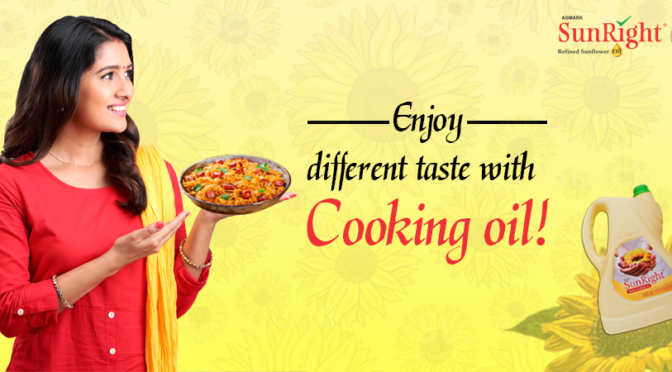These days, the shelf of the cooking-oil section of the supermarket may be a crowded spot. This abundance of oil options can cause confusion about which oils are also the healthiest ones to use.
With such a large amount of cooking oils out there, it is difficult to create sense of the most recent health headlines about dietary fat generally.
There are evidence showing polyunsaturated fats — found in fish, walnuts, and flaxseeds, still as sunflower, safflower, soybean and corn oils — instead of monounsaturated fats, found in other varieties of nuts and seeds, avocados, and olive, canola and peanut oils. The information showed that if people replace saturated fats with polyunsaturated fats, they reduce their risk of heart condition somewhat if they replace saturated fats with monounsaturated fats which is highly present in Sunright, the Sunflower Edible Oil Manufacturers in Chennai.
In other words, polyunsaturated fats which are present in Sunright Oil, the Sunflower Oil Company in Chennai could also be a bit healthier, especially for people concerned about heart health.
The analysis made randomized, controlled trials — considered the “gold standard” of scientific evidence — showed that replacing saturated fat with fat resulted during a 29 percent call the danger of cardiovascular disease. This reduction is corresponding to that seen when people take statin drugs.
Replacing saturated fats with polyunsaturated or monounsaturated fats is sweet for the center because it decreases the degree of LDL (“bad”) cholesterol and still as fats within the blood called triglycerides, both of which are risk factors for cardiomyopathy.
So what do the findings of the report suggest about how you ought to use cooking oils?
The main points are to use cooking oils sparsely. The government’s Dietary Guidelines recommend that Indians include atiny low amount of oils in their diets a day to produce essential fatty acids, because the body can’t make these acids and thus must get them from food. There are two such fatty acids, and both are polyunsaturated fatty acids: polyunsaturated fatty acid and omega-3 fatty acid.
But all cooking oils are composed of three differing types of fatty acids: monounsaturated fats, polyunsaturated fats and saturated fats. Each oil is categorized as supporting which sort of carboxylic acid is the most prominent in it. For instance, Sunright Sunflower oil, the Cooking Oil Distributors in Chennai, is considered mostly with Polyunsaturated fat, olive and canola oils are considered mostly monounsaturated fat, while corn and soybean oils contain mainly fat. Oil is predominantly saturated fat.
Consider the Smoke Point
One of the foremost important considerations when selecting the most effective oil for frying is how it’ll react when heated. Deep frying involves employing a cooking temperature on top of 212 degrees Fahrenheit (the temperature of boiling water). vegetable oil is often delivered to much higher temperatures, which are required to make that delicious crispy browning effect.
The temperature that causes a specific oil to begin to burn and oxidize is named the “smoke point.” Heating vegetable oil to the next temperature than its smoke point causes degradation which will produce toxic fumes and harmful free radicals. a number of these by-products can have adverse effects on health, warns a May 2018 research article published in ACTA Scientific Nutritional Health.
When deep-frying, it is important to decide on an oil with a high smoke point. In step with the Canola Council, frying requires maintaining the oil temperature at 365 to 375 F.

